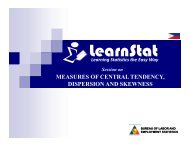Tripartite Validation Workshop of the Philippines Decent Work ...
Tripartite Validation Workshop of the Philippines Decent Work ...
Tripartite Validation Workshop of the Philippines Decent Work ...
You also want an ePaper? Increase the reach of your titles
YUMPU automatically turns print PDFs into web optimized ePapers that Google loves.
Annex 3. Message.<br />
Message<br />
Secretary Rosalinda Dimapilis-Baldoz, DOLE<br />
Introduction. It is my pleasure to join you today and I would like to thank you all for travelling from<br />
your place <strong>of</strong> work to attend this two-day tripartite validation workshop <strong>of</strong> <strong>the</strong> Philippine <strong>Decent</strong> <strong>Work</strong><br />
Country Pr<strong>of</strong>ile. We are deeply honoured that <strong>the</strong> Head <strong>of</strong> Delegation <strong>of</strong> <strong>the</strong> European Union<br />
Delegation to <strong>the</strong> <strong>Philippines</strong> have graciously taken time out <strong>of</strong> <strong>the</strong>ir busy schedule to join us as we<br />
discuss and review <strong>the</strong> progress made by <strong>the</strong> country in <strong>the</strong> area <strong>of</strong> <strong>Decent</strong> <strong>Work</strong>.<br />
We take pride as one <strong>of</strong> <strong>the</strong> countries to pilot <strong>the</strong> decent work program when ILO first endorsed <strong>the</strong><br />
framework in 1999. With support and technical assistance, <strong>the</strong> tripartite partners developed <strong>the</strong> first<br />
cycle <strong>of</strong> <strong>the</strong> National Plan <strong>of</strong> Action for <strong>Decent</strong> <strong>Work</strong> in 2002 or what we now refer to as <strong>the</strong> <strong>Decent</strong><br />
<strong>Work</strong> Common Agenda. It represents <strong>the</strong> areas <strong>of</strong> consensus that <strong>the</strong> tripartite agreed to pursue. These<br />
are <strong>the</strong> initiatives which we as a tripartite body committed to work on toge<strong>the</strong>r and lend support to one<br />
ano<strong>the</strong>r.<br />
During <strong>the</strong> first cycle, efforts were directed at introducing <strong>the</strong> decent work concept in <strong>the</strong> Philippine<br />
Development Plan. Because <strong>of</strong> <strong>the</strong> tripartite partner’s commitment to <strong>the</strong> objective, <strong>the</strong> pursuit <strong>of</strong> “full,<br />
decent, and productive employment” was integrated into <strong>the</strong> Medium term Philippine Development<br />
Plan for 2001-2004.<br />
By <strong>the</strong> second cycle <strong>of</strong> <strong>the</strong> <strong>Decent</strong> <strong>Work</strong> Common Agenda focused on aligning and harmonizing goals<br />
with <strong>the</strong> strategic objectives expressed in <strong>the</strong> Medium Term Philippine Development Plan for 2004-<br />
2010. During this cycle, three ILO Conventions were ratified namely: ILO Convention No. 29 on<br />
Forced labour, ILO Convention No. 143 for Migrant <strong>Work</strong>ers, and ILO Convention 97 concerning<br />
Migration for Employment.<br />
During <strong>the</strong> 3rd Cycle, membership <strong>of</strong> <strong>the</strong> National <strong>Tripartite</strong> Advisory Council, a high-level committee<br />
that provides direction to <strong>the</strong> activities and oversees <strong>the</strong> implementation <strong>of</strong> <strong>the</strong> Common Agenda, has<br />
been expanded to welcome <strong>the</strong> active participation <strong>of</strong> <strong>the</strong> Alliance <strong>of</strong> Progressive Labor (APL) and <strong>the</strong><br />
National Anti-Poverty Commission-<strong>Work</strong>ers in <strong>the</strong> Informal Sector (NAPC-WIS). The Federation <strong>of</strong><br />
Free <strong>Work</strong>ers (FFW), Trade Union Congress <strong>of</strong> <strong>the</strong> <strong>Philippines</strong> (TUCP),, Employers Confederation <strong>of</strong><br />
<strong>the</strong> <strong>Philippines</strong> (ECOP), and <strong>the</strong> Department <strong>of</strong> Labor and Employment (DOLE) comprised <strong>the</strong> rest <strong>of</strong><br />
<strong>the</strong> Committee.<br />
Philippine Labor and Employment Plan as <strong>the</strong> Fourth Cycle <strong>of</strong> <strong>the</strong> <strong>Decent</strong> <strong>Work</strong> Common<br />
Agenda. The Philippine Labor and Employment Plan (LEP) 2011 – 2016, as a complementary sectoral<br />
plan <strong>of</strong> <strong>the</strong> Philippine Development Plan (PDP) 2011 – 2016, adopts a decent and productive work<br />
framework in pursuit <strong>of</strong> inclusive growth.<br />
The LEP is not a plan <strong>of</strong> <strong>the</strong> DOLE but a product <strong>of</strong> a long process <strong>of</strong> consultation with and among<br />
government agencies, workers’ groups, employers’ groups, business and industry groups, civil society,<br />
migrant organizations as well as <strong>the</strong> youth. Having been unanimously adopted by <strong>the</strong> National<br />
<strong>Tripartite</strong> Industrial Peace Council last April, <strong>the</strong> Plan marks a milestone in policy making for <strong>the</strong><br />
country as we reflect <strong>the</strong> collective priorities <strong>of</strong> various stakeholders toward addressing issues in labour<br />
and employment over <strong>the</strong> medium term.<br />
A year after <strong>the</strong> adoption <strong>of</strong> <strong>the</strong> LEP, significant achievements in <strong>the</strong> area <strong>of</strong> employment, rights at<br />
work, social protection and social dialogue are now noticeable.<br />
In 2011, actual employment performance exceeded <strong>the</strong> target. A total <strong>of</strong> 1.4 million workers were<br />
placed for local employment as against <strong>the</strong> average target <strong>of</strong> one million local employment per year.<br />
27



